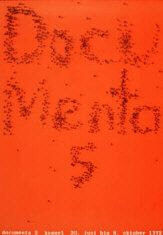Documenta 5
30 Jun - 08 Oct 1972
30 June - 8 October 1972
Kassel
documenta 5 in 1972 was regarded as the most important caesura in the history of the documenta thus far, as from now on the exhibition was placed under the aegis of an artistic director. As a response to the increasing complications arising from the internal organizational limits, as had been all too evident at documenta 4, Harald Szeemann, who had been head of Kunsthalle Berne until 1969 and also worked as a freelance curator, was appointed "General Secretary" with sole responsibility. At the same time, the principle of previous documenta-exhibitions – namely of selecting artworks according to their potential individual quality or novelty was abandoned. In its place, an overall thematic frame was created, within which the individual works were allocated more the role of representing it. Szeemann entitled his d5 “Questioning reality – pictorial worlds today “. He set out to systematically trace the relationship of visual forms of expression and reality. The exhibition offered to guide viewers in their ways of seeing in order to provide a better understanding of contemporary pictorial worlds. In a world that was increasingly dependent on the agency of the (mass) media for its representation, the reproduction of actual events could hardly be distinguished from reality as a staged event. The exhibition thus focused on the relationship between image and reality.
The concept's promise of encyclopedic reach was not comprehensively redeemed, but d5 stood out for an enormous range of works: Alongside a great number of artistic positions and trends, viewers were confronted with highly differing parallel domains of visual production, such as kitsch, advertising, political iconography, religious-ethnological images, science fiction or the "artwork of the insane". A major presentation of paintings and sculptures of European and American photorealism served to document how a new reference to reality had invaded art--and was a sensational success at documenta 5. Yet other forms of referencing reality were also accommodated by Szeemann's display. For example, performance and action art were lent great space, pinpointing the scope for art to act in an immediately tangible space - and Joseph Beuys' contribution to d5, his establishment of an office for his "Organization for direct democracy through plebiscite“ in Museum Fridericianum, where he debated with visitors for the full 100 days, highlighted art's claim to also take a hold on public life beyond any aesthetic categories.
Szeemann summarized the current trend of the early 1970s towards introverted, hermetic artistic statements with his heading "Individual Mythologies", and proceeded to present large works, often installations, designed to illustrate the often idiosyncratic intellectual cosmos of the individual artists. Thus, the young Belgian artist Panamarenko was showcased, with his monumental airship "Aeromodeller“ (1969-1971) –filling an entire room to demonstrate his obsession with the dream of flying.
Like no other documenta before it, given its comprehensive concept and the broad notion of art deployed, the d5 divided the general public and the experts into two camps: critics and enthusiastic champions.
General Secretary:
Harald Szeemann
Artists:
Vito Acconci
Richard Aeschlimann
Vincenzo Agnetti
Peter Alexander
John De Andrea
Giovanni Anselmo
Anatol Herzfeld (Arbeitszeit)
Archigram
Siah Armajani
Chuck Arnoldi (Charles Arnoldi)
Art & Language
Richard Artschwager
Michael Asher
John Baldessari
Robert Barry
Georg Baselitz
Lothar Baumgarten
Monika Baumgartl
Bernd und Hilla Becher
Robert Bechtle
Gottfried Bechtold
Joseph Beuys
Natalie Bieser
Karl Oskar Blase
Mel Bochner
Alighiero Boetti
Marinus Boezem
Christian Boltanski
Stan Brakhage
Claudio Bravo
George Brecht
KP Brehmer
Marcel Broodthaers
Stanley Brouwn
Günter Brus
Daniel Buren
Victor Burgin
Michael Buthe
Eugenia Butler
James Lee Byars
Pier Paolo Calzolari
Luciano Castelli
Christo & Jeanne-Claude
Chuck Close
Tony Conrad
Ron Cooper
Bill Copley (William Copley)
Joseph Cornell
Robert Cottingham
Paul Cotton
Hanne Darboven
Gino de Dominicis
Walter De Maria
Hermann Degkwitz
David Deutsch
Jan Dibbets
Herbert Distel
Ottomar Domnick
Dore O.
Marcel Duchamp
John Dugger
Stephen Dwoskin
Don Eddy
Franz Eggenschwiler
Ger van Elk
Richard Estes
Luciano Fabro
John C. Fernie
Robert Filliou
Jud Fine
Joel Fisher
Barry Flanagan
Y. Fongi
Terry Fox
Hollis Frampton
Howard Fried
Hamish Fulton
Barry Gerson
Franz Gertsch
Vittorio Gigliotti
Gilbert & George
Ralph Goings
Hubertus Gojowczyk
Larry Gottheim
Dan Graham
Nancy Graves
Hans Haacke
Duane Hanson
Guy Harloff
Michael Harvey
Haus-Rucker-Co
Birgit Hein & Wilhelm Hein
Auguste Herbin
Eva Hesse
Ernst Hiestand & Ursula Hiestand
Rebecca Horn
Jean-Olivier Hucleux
Douglas Huebler
Jörg Immendorff
Will Insley
Rolf Iseli
Ken Jacobs
Neil Jenney
Alfred Jensen
Jasper Johns
Joan Jonas
Howard Kanovitz
Edward Kienholz & Nancy Kienholz
Imi Knoebel
Christof Kohlhöfer
Jannis Kounellis
Tom Kovachevich
Piotr Kowalski
David Lamelas
Owen Land
Jean Le Gac
Barry Le Va
Alfred Leslie
Sol LeWitt
Richard Long
Ingeborg Lüscher
Inge Mahn
Robert Mangold
Brice Marden
Agnes Martin
Donatella Mazzoleni
Étienne Martin
Richard McLean
David Medalla
Dieter Meier
Fernando Melani
Jim Melchert
Mario Merz
Gustav Metzger
Russ Meyer
Bernd Minnich
Abraham David
Christian Moebuss
Malcolm Morley
Ed Moses
Bruce Nauman
Werner Nekes
Hermann Nitsch
Andrew Noren
Claes Oldenburg
Yoko Ono
Dennis Oppenheim
Robin Page
Blinky Palermo
Panamarenko
Giulio Paolini
A. R. Penck
Giuseppe Penone
Joachim Pfeufer
Elisabeth Pfund & Roger Pfund
Vettor Pisani
Sigmar Polke
Paolo Portoghesi
Stephen Posen
Rosa von Praunheim
Markus Raetz
Arnulf Rainer
Gerhard Richter
David Rimmer
Klaus Rinke
Dorothea Rockburne
Peter Roehr
Aldo Loris Rossi
Ulrich Rückriem
Allen Ruppersberg
Edward Ruscha
Reiner Ruthenbeck
Robert Ryman
John Salt Salvo (Salvatore Mangione)
Lucas Samaras
Günter Sarée
Paul Sarkisian
Jean-Frédéric Schnyder
Ben Schonzeit
Werner Schroeter
HA Schult
Armand Schulthess
Rudolf Schwarzkogler
Fritz Schwegler
Richard Serra
Paul Sharits
Alan Shields
Katharina Sieverding
Robert Smithson
Michael Snow
Holly Solomon & Bert Spielvogel
Irm & Ed Sommer
Keith Sonnier
Klaus Staeck
Paul Staiger
Jorge Stever
Robert Strübin
Paul Thek
Wayne Thiebaud
André Thomkins
David Tremlett
Richard Tuttle
Bernd Upnmoor
Ben Vautier
Franz Erhard Walther
Robert Watts
William Wegman
Bertram Weigel
Lawrence Weiner
Roger Welch
John Wesley
Horace Clifford Westermann
Joyce Wieland
William Wiley
Charles Wilp
Rolf Winnewisser
Adolf Wölfli
Tom Wudl
Klaus Wyborny
La Monte Young
Peter Young
Marian Zazeela
Gilberto Zorio

